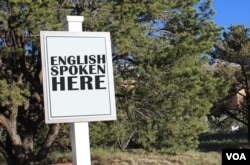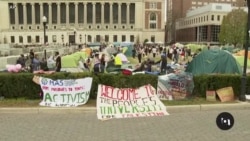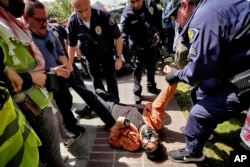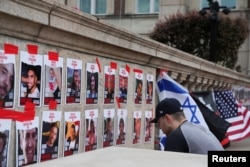Student Union
- By Hau Hoang
How to Speak English Fluently?
The most popular question I get from my friends in Vietnam is how to speak English fluently and correctly. I realize that it is a aching question that not just my friends, but also learners of this global language are trying to answer. In my case, even though I was taught English since the beginning of middle school in Vietnam, the things I learned then were barely adequate to carry out a conversation or even write up a letter in correct grammar.
In 9th grade, I decided to focus on studying English intensively on my own, which helped me land a scholarship to study in America through an exchange program – a thrilling turn for my education.
Obviously, being in the native speaking environment was a golden advantage, but at the same time, I still had to study and practice the language. By the end of high school, I was very confident with my English skills. All of my hard work paid off even more in college, because the classes at St. John’s College are discussion-based, so there’s a lot of talking.
Here are some of the things that worked for me when I was learning English. Since everyone has a different learning style, what worked for me won’t necessarily be best for you, but hopefully this will at least help you along.
Listen as much as possible
As I recall, the pronunciation I was taught in middle school in Vietnam are mostly incorrect. This is a common case because English pronunciation is not at all straightforward. There is nothing like the difficulty in trying to pronounce some of English's most difficult words. For me, the toughest words to master were words like "weird," "judge," and "noodle."
What helped was listening to native English speakers as much as possible, either through tapes, CDs, movies, or most prominently, the internet. I’m not exaggerating in saying that American movies and music were my principal English teachers in 9th grade. I would buy CDs of Westlife and Britney Spears, download the lyrics and sing along to the songs. And once in a while, my sister would bring me from Hanoi DVDs of American movies which I would watch over and over, and practice reading the subtitles along with the actors. I can still recite word-by-word the whole script of Mean Girls.
In this way, my English study was basically an immersion, though indirect, in the English language as well as the American culture. My pronunciation and speaking skill therefore improved very quickly. I got to learn the real English – what real Americans say to each other in everyday life; for example, saying "How are you doing?" instead of the ordinary "How are you?"
Judge yourself
When you practice speaking by repeating along with a recording, be somewhat hard on yourself, try to imitate as close as possible to the speaker's pronunciation, and most importantly, the intonation of the sentence - this will help you carry out a more natural and smooth conversation in English.
It is also very helpful to have a dictionary with International Phonetics Alphabet (IPA) pronunciation (I recommend Oxford, Macmillan, or Dictionary.com for those who have home internet access). Of course, the first step would be to learn how to read the IPA symbols (some YouTube videos can help teach you that). I always use this guide to learn the pronunciations of new words, and also to make sense of the pronunciation in the recording.
Specifically, by looking at the "anatomy" of the pronunciation, you will be able to greatly improve your pronunciation. For example, since Vietnamese words all have one syllable, a lot of Vietnamese pronounce the word “hôm” for “home” since their sounds are seemingly equivalent. When you look up the IPA pronunciation of this word, however, you will see that it actually consists of two syllables /ho-ʊm/. As a result, you should practice perfecting your pronunciation by saying the two syllables separately and quickly. Eventually it will become an instinctive thing to pronounce “home" in that correct manner.
Variety is key
For me, the key to speaking English fluently is sentence structures. The more structures you know, the more comfortable you will be when trying to express your thoughts.
My advice would be try to master the fundamental structures - “for example,” “I think that,” “it is interesting that,” “I find it,” “it is better to,” “not only … but also” - by practicing them over and over. A good familiarity with the structures will help with the coherence of the conversation.
As you expand your knowledge in sentence structures, it is also important to augment your vocabulary. It is always wise to constantly try new words in conversation due to the mutual relationship between speaking and learning new words: you need more words to express your thoughts precisely, and at the same time, it is easiest to learn new words when they are uttered and put in context.
Learning to speak English fluently is a difficult task. On top all of the tips I listed above, my final advice would be to practice as much as possible because really, practice makes perfect. Good luck everyone!
See all News Updates of the Day
Pro-Palestinian protests spread on US university campuses
U.S. university campuses are seeing pro-Palestinian protests daily. Students are demonstrating against the Israel-Hamas war in Gaza and demanding that humanitarian aid be allowed to flow into the territory. VOA’s Veronica Balderas Iglesias reports.
US police clash with students who demand colleges cut financial ties to Israel
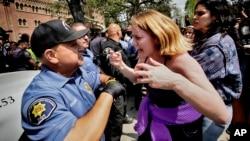
Police tangled with student demonstrators in the U.S. states of Texas and California while new encampments sprouted Wednesday at Harvard and other colleges as school leaders sought ways to defuse a growing wave of pro-Palestinian protests.
At the University of Texas at Austin, hundreds of local and state police — including some on horseback and holding batons — clashed with protesters, pushing them off the campus lawn and at one point sending some tumbling into the street. At least 20 demonstrators were taken into custody at the request of university officials and Texas Governor Greg Abbott, according to the state Department of Public Safety.
A photographer covering the demonstration for Fox 7 Austin was arrested after being caught in a push-and-pull between law enforcement and students, the station confirmed. A longtime Texas journalist was knocked down in the mayhem and could be seen bleeding before police helped him to emergency medical staff who bandaged his head.
At the University of Southern California, police got into a back-and-forth tugging match with protesters over tents, removing several before falling back. At the northern end of California, students were barricaded inside a building for a third day at California State Polytechnic University, Humboldt. The school shut down campus through the weekend and made classes virtual.
Harvard University in Massachusetts had sought to stay ahead of protests this week by limiting access to Harvard Yard and requiring permission for tents and tables. That didn't stop protesters from setting up a camp with 14 tents Wednesday following a rally against the university's suspension of the Harvard Undergraduate Palestine Solidarity Committee.
Students protesting the Israel-Hamas war are demanding schools cut financial ties to Israel and divest from companies enabling its monthslong conflict. Dozens have been arrested on charges of trespassing or disorderly conduct. Some Jewish students say the protests have veered into antisemitism and made them afraid to set foot on campus.
Columbia University averted another confrontation between students and police earlier in the day. The situation there remained tense, with campus officials saying it would continue talks with protesters for another 48 hours.
On a visit to campus, U.S. House Speaker Mike Johnson, a Republican, called on Columbia University President Minouche Shafik to resign "if she cannot bring order to this chaos."
"If this is not contained quickly and if these threats and intimidation are not stopped, there is an appropriate time for the National Guard," he said.
Shafik had set a midnight Tuesday deadline to reach an agreement on clearing an encampment, but the school extended negotiations, saying it was making "important progress."
On Wednesday evening, a Columbia spokesperson said rumors that the university had threatened to bring in the National Guard were unfounded. "Our focus is to restore order, and if we can get there through dialogue, we will," said Ben Chang, Columbia's vice president for communications.
Columbia graduate student Omer Lubaton Granot, who put up pictures of Israeli hostages near the encampment, said he wanted to remind people that there were more than 100 hostages still being held by Hamas.
"I see all the people behind me advocating for human rights," he said. "I don't think they have one word to say about the fact that people their age, that were kidnapped from their homes or from a music festival in Israel, are held by a terror organization."
Harvard law student Tala Alfoqaha, who is Palestinian, said she and other protesters want more transparency from the university.
"My hope is that the Harvard administration listens to what its students have been asking for all year, which is divestment, disclosure and dropping any sort of charges against students," she said.
Columbia encampment inspires others
Police first tried to clear the encampment at Columbia last week, when they arrested more than 100 protesters. The move backfired, acting as an inspiration for other students across the country to set up similar encampments and motivating protesters at Columbia to regroup.
On Wednesday about 60 tents remained at the Columbia encampment, which appeared calm. Security remained tight around campus, with identification required and police setting up metal barricades.
Columbia said it had agreed with protest representatives that only students would remain at the encampment and they would make it welcoming, banning discriminatory or harassing language.
On the University of Minnesota campus, a few dozen students rallied a day after nine protesters were arrested when police took down an encampment in front of the library. U.S. Representative Ilhan Omar, whose daughter was among the demonstrators arrested at Columbia last week, attended a protest later in the day.
A group of more than 80 professors and assistant professors signed a letter Wednesday calling on the university's president and other administrators to drop any charges and to allow future encampments without what they described as police retaliation.
They wrote that they were "horrified that the administration would permit such a clear violation of our students' rights to freely speak out against genocide and ongoing occupation of Palestine."
Netanyahu encourages police response
Israeli Prime Minister Benjamin Netanyahu lashed out at the pro-Palestinian demonstrations on U.S. college campuses in a video statement released Wednesday, saying the response of several university presidents has been "shameful" and calling on state, local and federal officials to intervene.
Students at some protests were hiding their identities and declined to identify themselves to reporters, saying they feared retribution. At an encampment of about 40 tents at the heart of the University of Michigan's campus in Ann Arbor, almost every student wore a mask, which was handed to them when they entered.
The upwelling of demonstrations has left universities struggling to balance campus safety with free speech rights. Many long tolerated the protests, but are now doling out more heavy-handed discipline, citing safety concerns.
At New York University this week, police said 133 protesters were taken into custody and all had been released with summonses to appear in court on disorderly conduct charges. More than 40 protesters were arrested Monday at an encampment at Yale University.
Columbia University demonstrators in talks with administration officials
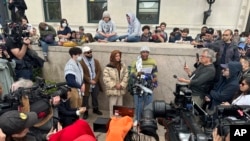
Officials at Columbia University were continuing talks Wednesday with student demonstrators from the Gaza Solidarity Encampment as the protest reaches a full week.
At 9:41 p.m. Tuesday, university President Nemat “Minouche” Shafik sent an email to the Columbia community setting a midnight deadline for an agreement to be reached about dismantling the encampment and dispersing the protesters.
“I very much hope these discussions are successful,” she wrote. “If they are not, we will have to consider alternative options for clearing the West Lawn and restoring calm to campus so that students can complete the term and graduate.”
As midnight passed, Columbia University Apartheid Divest posted a statement on X saying, “We refuse to concede to cowardly threats and blatant intimidation by university administration. We will continue to peacefully protest.”
The statement also said the university had threatened to call the National Guard. But after visiting the university earlier in the week, New York Governor Kathy Hochul said Tuesday she had no plans to deploy the National Guard.
As midnight approached on Tuesday, a student organizer announced that the deadline had been extended to 8 a.m. Wednesday.
At 4:09 a.m., the Office of the President sent an email saying the discussion deadline would be extended for 48 hours, given the constructive dialogue, and the university would report back on progress.
The email announced that leaders of the student encampment had agreed to remove a significant number of tents, get non-Columbia affiliates to leave the encampment and comply with New York Fire Department requirements. They also agreed to ensure that the encampment is “welcome to all” and to prohibit “discriminatory or harassing language.”
This development comes nearly a week after more than 100 students were arrested at the school on April 18, after Shafik authorized police to clear away protesters. Some of the students received suspension notices from the school.
Columbia’s action prompted an onslaught of pro-Palestinian demonstrations at other universities and responses from faculty and politicians.
Students at other campuses, such as Yale, Stanford and New York University, have also rallied around the Palestinian cause, calling for their universities to divest from companies with ties to Israel and for a cease-fire in Gaza. Many also have put up tent encampments on their campuses. About 150 students and faculty were arrested at New York University Monday night.
Columbia also announced Tuesday morning that classes on the Morningside main campus, where the protests are taking place, will be offered in a hybrid format for the remainder of the spring semester. The last day of classes is April 29.
- By VOA News
Paper: International students faced extra pandemic challenges
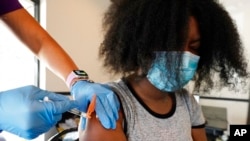
Astrobites, which describes itself as "a daily astrophysical literature journal written by graduate students in astronomy since 2010," focuses on the challenges international students faced during the COVID-19 pandemic.
It examines a paper published in the Journal of Comparative & International Higher Education entitled The Impact of the COVID-19 Pandemic on International Students in a Public University in the United States: Academic and Non-academic Challenges.
Read the Astrobites article here. (April 2024)
- By VOA News
15 cheapest US universities for international students
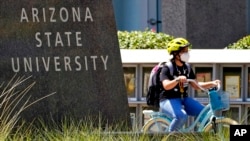
Yahoo!Finance has compiled a list of the 15 cheapest U.S. universities for international students.
Among them: Arizona State University, the University of North Carolina at Chapel Hill and Michigan State University.
Read the list here. (March 2024)




